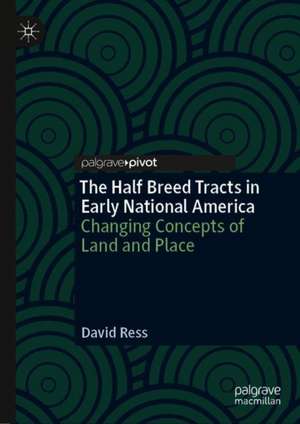The Half Breed Tracts in Early National America: Changing Concepts of Land and Place
Autor David Ressen Limba Engleză Hardback – 7 noi 2019
Preț: 417.30 lei
Nou
Puncte Express: 626
Preț estimativ în valută:
79.88€ • 86.79$ • 67.14£
79.88€ • 86.79$ • 67.14£
Carte tipărită la comandă
Livrare economică 21 aprilie-05 mai
Preluare comenzi: 021 569.72.76
Specificații
ISBN-13: 9783030314668
ISBN-10: 3030314669
Pagini: 130
Ilustrații: IX, 130 p.
Dimensiuni: 148 x 210 mm
Greutate: 0.32 kg
Ediția:1st ed. 2019
Editura: Springer International Publishing
Colecția Palgrave Pivot
Locul publicării:Cham, Switzerland
ISBN-10: 3030314669
Pagini: 130
Ilustrații: IX, 130 p.
Dimensiuni: 148 x 210 mm
Greutate: 0.32 kg
Ediția:1st ed. 2019
Editura: Springer International Publishing
Colecția Palgrave Pivot
Locul publicării:Cham, Switzerland
Cuprins
1. Introduction: A Caught-Between People and an Undefined Land.- 2. Blondeau's Dilemma.- 3. Separation or Separate Property: The Unsettling Prospect of Ownership.- 4. Washington's Dilemma.- 5. The Courthouse Coup in Iowa.- 6. Scrip and the Taking of the Minnesota Half Breed Tract.- 7. Taking the Nebraska Half Breed Tract.- 8. Charley's land.- 9. Conclusion
Notă biografică
David Ress is a journalist and honorary research associate at the University of New England, Australia. He is the author of Municipal Accountability in the American Age of Reform (Palgrave, 2018) and Governor Edward Coles and the Vote to Forbid Slavery in Illinois, 1823–1824 (2006).
Textul de pe ultima copertă
In 1824 and 1830, over one hundred thousand acres across Iowa, Minnesota and Nebraska were set aside as a home for descendants of Native American women and white traders and trappers. The treaties that established these so-called Half Breed Tracts left undefined exactly who held claim to the land, and by the end of the 1850s, settlers and speculators had appropriated virtually every acre for themselves. But in an era of ravenous westward expansion, why did the process of dispossession require three decades of debate and legal maneuvering? As David Ress argues, the fate of the Half Breed Tracts challenges longstanding ideas about land tenure and community in early national America.
Caracteristici
Explores nineteenth-century ideas about land tenure, property and citizenship through the history of reservations set aside for the children of Native American women and white men Sheds light on an understudied episode in the history of US land policy Appeals to scholars and students of nineteenth-century American history, US land policy, Native American studies, settler colonialism, and the history of ideas of rights and property
